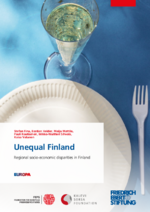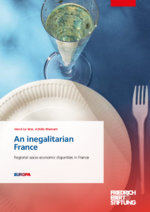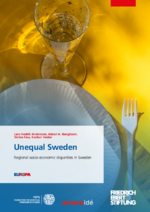Ungleiches Europa
Ungleiches Europa – Die regionale Spaltung Europas lösen
Die Früchte wirtschaftlichen Wachstums und steigender Beschäftigung sind bisher nicht nur innerhalb der Gesellschaft, sondern auch geographisch ungleich verteilt. Das hat zur Folge, dass viele europäische Staaten große räumliche Ungleichheiten aufweisen. Wirtschaftliches Wachstum und ausreichend Arbeitsplätze beschränken sich häufig auf dynamische urbane Räume. Das dies nachteilig für ländliche oder vom Strukturwandel betroffene Gebiete ist, liegt auf der Hand. Die sozioökonomischen Probleme, die zu den wachsenden sozialen und räumlichen Ungleichheiten führen, wurden bisher durch demokratische Akteure und Institutionen nicht gelöst. Eine Folge davon ist die steigende Unzufriedenheit in vielen europäischen Ländern mit dem politischen und demokratischen System. Dies hat häufig auch zum Aufstieg des Rechtspopulismus beigetragen.
Berichte über Ungleichheiten innerhalb der Länder
Die Friedrich Ebert Stiftung hat gemeinsam mit der Foundation for European Progressive Studies (FEPS) das Projekt „Ungleiches Europa – Die regionale Spaltung Europas lösen” ins Leben gerufen. Dieses hat zum Ziel, das Ausmaß der regionalen Disparitäten in Schweden, Finnland, Estland, Italien, Frankreich und Rumänien zu untersuchen und wichtige Fragen zu beantworten:
- Was sind die Antworten auf die genannten Herausforderungen?
- Wie kann die Politik in den EU-Mitgliedsländern und der Europäischen Union die sozialen und ökonomischen Unterschiede angehen?
Weiterlesen
Kontakt
Dr. Philipp Fink,
Leiter des Büros der Nordischen Länder
der Friedrich-Ebert-Stiftung
Philipp.Fink(at)fes.de
+46 76 848 67 05
David Rinaldi
Director of Policy Studies
Foundation for European Progressive Studies
david.rinaldi(at)feps-europe.eu
+32 (0)2 234 69 00
EU-Bericht
Hacker, Björn
Ungleiches Europa
Stockholm, 2021
Zum Download (PDF) (8,2 MB, PDF-File)
Präsentation des EU Berichts, 04.10.2021 (Video)
Länderberichte
Ungleiches Finnland
Unequal Finland
Stockholm, 2021
Zum Download (PDF) (1,1 MB PDF-File)
Ungleiches Rumänien
Fina, Stefan; Heider, Bastian; Raţ, Cristina
Unequal Romania
Bucharest, 2021
Zum Download (PDF) (1 MB, PDF-File)
Ungleiches Frankreich
Le Bras, Hervé; Warnant, Achille
An inegalitarian France
Stockholm;Paris, 2021
Zum Download (PDF) (16 MB, PDF-File)
The » gilets jaunes « (yellow or »hi viz« vests) protests in France have brought to light far-reaching regional grievances and socioeconomic disparities that run counter to the aspiration to equal living conditions for all. A closer look at these regional disparities shows a »fragmented« country, riven at all administrative levels by numerous faultlines. Despite – or perhaps even because – of the centralised redistribution policy an active state is no longer discernible for many people living in the regions.
Weiterlesen
Ungleiches Italien
Fina, Stefan; Heider, Bastian; Prota, Francesco
Unequal Italy
Rom, 2021
Zum Download (PDF) (1,7 MB, PDF-File)
Ungleiches Schweden
Unequal Sweden
Stockholm, 2021
Zum Download (PDF) (1,3 MB PDF-File)
Ungleiches Estland
Fina, Stefan; Heider, Bastian; Masso, Märt
Unequal Estonia
Riga, 2021
Zum Download (PDF) (1 MB, PDF-File)






